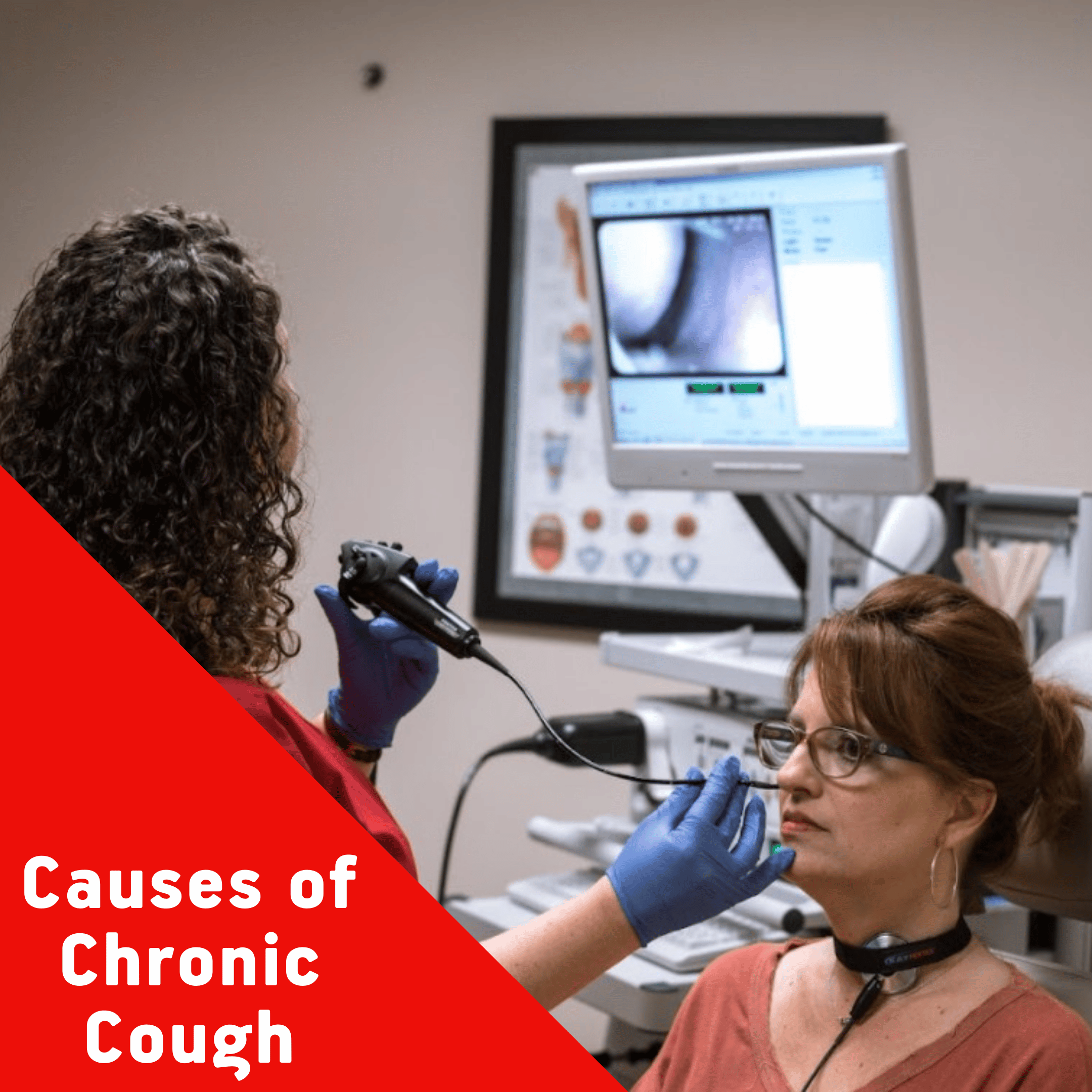We’ve all experienced occasional bad breath after a cup of coffee or a garlicky meal.…

Causes of Chronic Cough
A cough that just won’t go away is one of the most common reasons for a visit to the doctor. Many people initially visit their primary care physician, but if the issue isn’t easily resolved, other doctors and specialists may become involved, such as allergists, pulmonologists, otolaryngologists (ENT), and speech-language pathologists (SLP), such as ExcelENT’s SLP, Amy Pittman.
Amy sees patients often who complain of a chronic cough. It’s annoying for the person experiencing it and others in the home, and it can disrupt sleep and cause headaches. We’re thankful that there are many ways in which Amy can help get to the bottom of the cause and find an effective solution.
Definition & Causes of Chronic Cough
According to the American Speech-Language Hearing Association, coughing helps you clear your throat and lungs and can prevent infection. But sometimes a cough can become chronic, lasting more than four weeks in children and more than eight weeks in adults. Aside from the extended duration of the cough, signs and symptoms include the frequent need to cough and having a rough-sounding voice due to that frequent coughing.
Chronic cough can be tricky because there are several possible causes. Here are the most common ones we see.
Postnasal Drip
Also called upper airway cough syndrome, postnasal drip is a common cause of a persistent cough. When a virus, allergies, dust, chemicals, or inflammation irritate your nasal membranes, they make runny mucus that drips down your throat. This makes you cough, especially at night when you lie down.
Asthma
When you have asthma, the muscles around your airways tighten, the lining of your airways swells, and cells in your airways produce thick mucus. Coughing is your body’s way of trying to get air into those restricted areas and can be triggered by infections, weather, allergies, tobacco smoke, medications, exercise, and emotions.
Infections
After you have recovered from a cold, flu, or pneumonia, you may continue to have a cough as your body completely heals and gets over the infection. COVID-19, the illness caused by SARS-CoV-2, sometimes leads to lasting lung inflammation and a lingering dry cough. The prolonged cough from COVID-19 is no different than any other virus that affects your lungs. The injured parts of your lungs are trying to clear out the infection and heal.
Laryngopharyngeal Reflux (LPR)
LPR, sometimes confused with gastroesophageal reflux disease (GERD), is a condition in which acid escapes from the stomach and goes into the esophagus and throat. This causes irritation to the throat, vocal cords, and even the nasal passages. It may result in voice problems, swallowing problems, sinus drainage, the frequent need to clear the throat, and chronic cough.
Blood Pressure Medications
ACE inhibitors for blood pressure can cause a chronic dry cough. When a patient has a persistent cough and takes an ACE inhibitor, a slight change in medication often helps resolve the cough.
Smoking
Smoking damages your lungs, as well as the rest of your body. Smokers often experience chronic cough because chemicals and particles in tobacco smoke irritate the lungs. In response, the body makes mucus to try to get rid of it through frequent coughing. In all situations, we recommend stopping smoking to address a chronic cough and for many other reasons.
Irritable Larynx Syndrome (ILS)
ILS involves a range of conditions including chronic throat clearing, chronic cough, and others. With ILS, the larynx (voice box) becomes very sensitive to stimuli, such as strong smells, cold air, talking, and more. There are several possible causes, including viral illnesses that cause inflammation of the nerve that supplies the voice box, GERD, allergies, sinusitis, certain medications, environmental exposures, and stressful life occurrences.
Symptoms of ILS usually last longer than three weeks and have no other identifiable cause. Symptoms may include frequent non-productive throat clearing, chronic coughing attacks that bring up little or no mucus, and difficulty breathing with the sudden onset of stridor (noisy breathing).
Testing & Treatment for Chronic Cough
Our SLP, Amy Pittman, will likely work with you to get a comprehensive history regarding your chronic cough. She may perform a thorough laryngoscopic and stroboscopic examination to visualize patterns of vocal fold motion and vocal fold vibration. She may also test your voice to see if there are any changes in vocal quality that the cough might be causing.
We can work to find out more about what triggers your cough so that you can avoid those triggers. In some cases, treatment is straightforward, such as recommendations to stop smoking or making changes to medications. In other cases, you may need treatment for medical conditions, such as allergies, asthma, or LPR if those are triggers for your chronic cough.
Many times, the goal of treatment for chronic cough is to give you the tools to better manage it, and Amy can teach you more about keeping your vocal cords healthy.
Address Chronic Cough with ExcelENT of Alabama
We are happy to answer questions about chronic cough and other ear, nose, and throat issues. Schedule an appointment online, or call to discuss coming in at a time that’s best for you: 205-988-6858.


